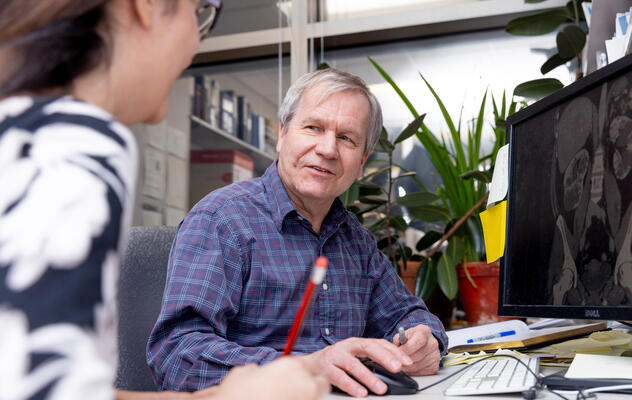 Conquering kidney disease
Conquering kidney disease
Dr. Harris and a lab member analyze research images as part of their work to deepen understanding about the mechanisms of cyst development in polycystic kidney disease (PKD).
Overview
As principal investigator of the Kidney Disease Discovery Laboratory at Mayo Clinic, Peter C. Harris, Ph.D., studies molecular events associated with genetic kidney diseases, such as polycystic kidney disease (PKD) and monogenic kidney stone disease.
Dr. Harris' extensive research in kidney disease is advancing scientific understanding of the pathogenesis of PKD and kidney stones. The lab's work is helping improve diagnostics and prognostics for these conditions.
PKD has various forms. Autosomal dominant polycystic kidney disease (ADPKD) is a common, late-onset kidney condition that typically requires a kidney transplant or kidney dialysis. Autosomal recessive polycystic kidney disease (ARPKD) is a less common form that generally develops in infancy and is associated with a high level of neonatal death and childhood kidney failure. In addition, there are several syndromic diseases that include a PKD phenotype.
These kidney conditions are collectively called ciliopathies. Primary cilia, which are sensory organelles that protrude from the apical surface of epithelial cells, are thought to be the sites of the proteins defective in ADPKD and ARPKD.
Proteins associated with cilia formation and protein trafficking are involved in syndromic PKDs. Meckel syndrome is one such syndromic ciliopathy. This is a lethal recessive condition that involves problems with the central nervous system, digits and liver and is characterized by PKD.
Our PKD studies focus on:
- Finding genes that are mutated in these conditions.
- Correlating phenotype with genotype.
- Understanding the normal roles of PKD proteins and how they cause PKD when disrupted.
- Identifying the genetic causes of kidney stone disease and correlating genotype with phenotype.